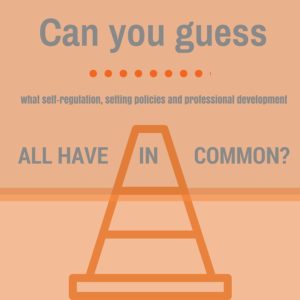 In this series, I’m exploring how #ece professional development is failing teachers.
In this series, I’m exploring how #ece professional development is failing teachers.
In my opinion, our professional development (PD) efforts do not include sufficient attention to supporting teachers’ social-emotional skills, and we need to approach PD from a more wholistic perspective.
In order to support the social-emotional well-being of adult learners, I’ve offered five skills that can be addressed in equal parts during PD, which in the past, has been solely oriented toward compliance, implementation, and change in practice.
The five social-emotional skills include:
Self-regulation: Ability to prioritize self-care; identifies, copes with, and adapts to stressors; sets clear personal and professional boundaries; and reframes negative thoughts and reactions when triggered.
Suggestion for PD:
This week’s suggestion for PD, stems from lessons learned during a class hosted by my friend and colleague, Dr. Meggin McIntosh (@MegginMcIntosh), president of Emphasis on Excellence, Inc. The class was titled, “Setting Personal and Professional Policies.”
During the class, Meggin defined policies as inherently different from rules or guidelines. She argued that policies are, in fact, “strategically crafted statements used to establish boundaries for your time, energy, and attention.” Further, she pressed that because “policies are not up for discussion,” they are invaluable in our efforts to have more control over our responses and how we spend our time.
Thus, while you may not have ever set personal or professional policies, they aren’t all that different from policies set by organizations and agencies, and are just as necessary. Policies create clear boundaries, help us to prioritize our time, and help us achieve desired outcomes. Further, clear boundaries support self-regulation and our ability to respond in productive ways.
Let’s explore the idea of setting personal and professional policies a bit further, then examine how they can be embedded into PD as a means of supporting and encouraging self-regulation in adult learners.
Meggin uses the metaphor of a traffic cone to describe how policies: 1) inform others and provide feedback on what is and is not ok; 2) create obvious cues to guide actions and decision-making; and 3) can be put into place and/or removed as needed.
 Using Meggin’s “sentence starters,” such as, “I don’t, I limit, I give, and All requests for,” adult learners can be encouraged to create policies that help them to self-regulate.
Using Meggin’s “sentence starters,” such as, “I don’t, I limit, I give, and All requests for,” adult learners can be encouraged to create policies that help them to self-regulate.
Here are a few examples from my own work in delivering PD at the preservice and inservice level.
When conducting trainings, with groups of adult learners, I put a spin on action planning, by first asking participants to consider what they can stop doing to make room for the new or prioritized practices.
Further, I invite them to write a policy that will help them set clear boundaries and make room for the practices they want or need to implement. For example:
- All guests and visitors to my classroom sign in on the whiteboard by the door so that my assistants and I know who is visiting.
- Each year, I choose one fundraising activity that aligns with desired outcomes and is a fit with our classroom values (e.g., we won’t sell candy since we are learning about making healthier food choices).
- In order to recharge my emotional and mental reserves, to best serve my children and their families, I will decline most, if not all, invitations to social gatherings.
When working with graduate students, I’ve started to help them identify policies that will allow them to build their curriculum vitae, take care of family and work obligations, and attend to their studies. For example:
- Prior to defending my dissertation, I will be on no more than one committee in my national organization and will submit a proposal to be a speaker at a national or regional meeting.
- When requested to do something by my mentor, I will ask specifically what it is about this experience that is valuable and why it’s something they recommend for me.
- I do _____ pro bono presentations/trainings each year within my area of expertise, and within driving distance of my home.
Because setting boundaries (aka policies) becomes a way to enhance our ability to self-regulate, I, too, have begun to set policies. Here are a few examples of mine:
- I do not schedule meetings the day after I’ve traveled or provided a full day of training/coaching.
- I limit the number of articles submitted for publication that I will review, to one per quarter.
- Those requesting letters of recommendation must provide an updated resume, all relevant information about the job, clear submission procedures, and a deadline.
- I do not allow myself to access mobile devices once I’ve headed to bed at night.
Make sense? Starting to see how if we set policies, we are better able to regulate (i.e., better able to adapt and manage change, understand the best response for the situation, and how we can better control emotional reactions)?
Want to learn more about setting professional and personal policies?
- Read about my newest policies [blog]
- Meggin’s productivity tips on saying no [link]
- What a toddler can teach us about saying no [blog]
P.S. Continue learning how you can design and deliver PD to strengthen the social-emotional skills of adult learners by reading the next blog post titled, “How to Leverage Social Networks to Improve Practice“